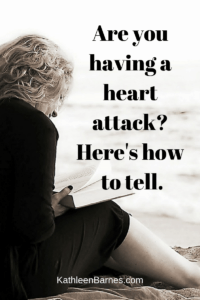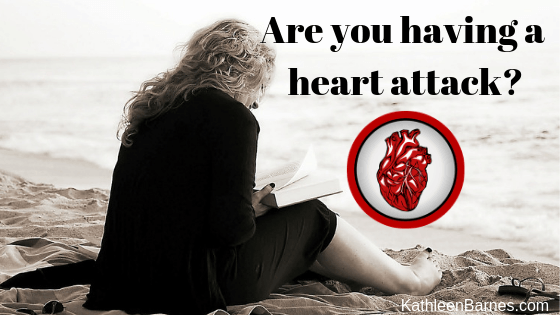 Heart disease is the Number 1 killer of men and women in the Western world. Most people think that heart disease is male territory, but nothing could be further from the truth.
Heart disease is the Number 1 killer of men and women in the Western world. Most people think that heart disease is male territory, but nothing could be further from the truth.
Heart disease kills more than 400,000 women a year. One in every three female deaths is from heart disease. That’s ten times the death rate from the most dreaded women’s disease: breast cancer.
And (this is daunting): Nearly two-thirds of women who die of heart attacks had no previous symptoms.
Most of us think of a heart attack like they’re portrayed in the movies:
- a sudden squeezing pain in the chest
- a radiating pain in the left arm
- gasping for breath
- profuse sweating
Those are most likely the symptoms experienced by men and even by some women. Women have a vastly different physiology and their symptoms may also be vastly different from those experienced by men.
Just because you’re not clutching your chest and struggling to breathe, you could still be having a heart attack.
Here are some of the non-classical symptoms most often experienced by women that can be much more subtle and perhaps confusing:
- Unexplained extreme exhaustion: “I thought I had the flu.”
- Heartburn: “I shouldn’t have eaten that burrito.”
- Profuse sweating: “I must be having a hot flash.”
- Shortness of breath: “I feel like I just ran a marathon while sitting on the sofa.”
- Nausea and cold sweat: “This really must be the flu.”
- Restlessness and insomnia: “Oh, dang, another menopause symptom.
- Feeling of pressure in shoulder, jaw, neck or back: “Maybe I slept wrong.”
- Bluish color of lips, hands or feet indicating lack of circulation: “Maybe my hands are cold.”
- A persistent dry barking cough: “It’s just allergies.”
Any abrupt change in the way you feel is cause for concern. Some women even report a sense of impending doom. Yet women are more likely to wait longer to call for help than men.
Women have a tendency to minimize our symptoms for a number of reasons (maybe it’s “mom stuff” and taking care of others before we take care of ourselves). Sometimes we are afraid of feeling silly or being hypochondriacs.
Yes, sometimes the symptoms disappear on their own, but that doesn’t mean you haven’t had a heart attack. It means you’ve dodged the bullet. For now. More than one-quarter of women who have a first attack, recognized or not, are dead within a year.
Women are also much more likely than men to be dismissed as having imaginary symptoms by ER docs. A New England Journal of Medicine article said women are seven times more likely to be misdiagnosed in emergency rooms then men and sent home in mid heart attack.
Yet we women pride ourselves on our intuition. When you’re experiencing any of these symptoms or simply a feeling of “something’s not right,” seek attention immediately.
Do not drive yourself to the emergency room.
Do not pay attention to those silly tropes about deep coughing “self-CPR” that run around the Internet periodically. You’ll be unconscious in a few seconds and potentially dead minutes later.
Use your seconds to call 911. It could mean your life.
Yes, of course, I am passionate about natural health and yes, it’s best to prevent heart attacks. You know what to do: exercise, control cholesterol and blood pressure, control your weight, de-stress, eat a healthy diet. That’s all well and good, but stuff happens despite our most healthy intentions.
If you experience any of these symptoms. Do yourself and your family and friends a favor and seek medical attention urgently. Don’t become one of those grim statistics.








Thank you for these symptom reminders and the discounting quotes beside them. We are quick to explain them away. When we don’t take action, a “silent” heart attack may be taking place, leaving a person more vulnerable for a big one that could be instantly fatal. The indigestion vs heartburn piece is more subtle as we reach for a Tums. I often chew a Papaya enzyme tablet after eating tomato based or even dairy foods that give me a bit of indigestion. That’s why I hope I haven’t missed something more serious.